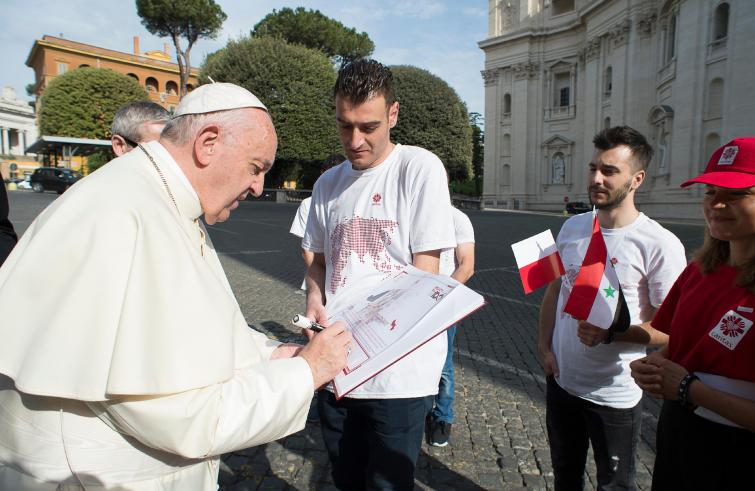Solidarity
The Caritas Poland bus that initiated an international solidarity program arrived in St. Peter’s Square. The Pope’s blessing, the Church’s commitment, which also involves parishes and Catholic schools. The statue of Our Lady of Aleppo will return to Poland with a prayer to end the bloody conflict in the Middle East. In the meantime, local charity services proceed

The Caritas Poland bus that arrived on the morning of Wednesday, May 2, in the Vatican courtyard to receive the special blessing of Pope Francis marks the beginning of an adventure upon the 100th anniversary of the independence of Poland. The bus will travel across over one hundred Polish villages and cities, and will end its journey in late August at the Warsaw stadium with a large gathering of volunteer workers.
Father Marcin Izycki, Director of Caritas Poland, in a conversation with SIR highlighted the contribution of diocesan and parish associations and those created in schools throughout the Country. “As members of Caritas Europe we wish to be the heralds of Young Caritas in the central-eastern part of the continent, showing our projects and initiatives for children, the elderly and the needy”, he said, emphasizing that Caritas Poland “accompanies hundreds of thousands of Poles throughout their lives through works of mercy” to which, however, “young volunteers are expected to participate in increasing numbers.” Caritas Poland is actively engaged in carrying out activities worldwide. “We work in many parts of the world, we have just completed the construction of a soup kitchen in Venezuela, we help several African countries where our missionaries carry out their service, and we are prepared to intervene in case of natural disasters”, said Fr Izycki. During the meeting in the Vatican the project that will bring a statue of Our Lady of Aleppo across Poland, was presented to the Pope. The purpose of the initiative is to help martyred Syria through the prayers of the faithful to the Holy Virgin. In Syria, the priest said, “war should never have broken out. Instead, it has been lasting more than many other armed conflicts in the world.”
What is the commitment of Caritas Poland for Syria?
As Caritas Poland, in the past fifteen months, we devolved over 7 million Euros (30 million Pln, Polish zloty) to the population of Aleppo through the Churches operating in Syria. Most of the sums allow the purchase of foodstuffs, fuel for heating homes in the cold season, clothing items and other necessities. Other projects are being carried out at local level. In Aleppo we activated the Hope Center, where Syrian workers verify the requests and financing proposals that are then transmitted to us. In the hope that the war in Syria will end soon, we launched a program that subsidizes small businesses such as bakeries, shoemakers’ shops or opticians’ shops. We have already received over 100 requests for subsidies whose amount does not exceed 5 thousand dollars. The contribution should enable the inhabitants of Syria to start their own activity, but on the other hand we don’t want people to get used to receive funding from external contributors thereby thwarting their entrepreneurial spirit. Then there are the children… In the Middle East there are no “orphans”, meaning that if the children have lost their parents their relatives take care of them. Nonetheless we try to help children who lost their parents providing basic necessities and ensuring their education. Every month we transfer approximately 2 million zlotys (just under 500 thousand Euros, Ed.’s note) to Beirut where the eight Christian Churches present locally – that enjoy our full trust knowing their bishops – distribute our contributions.
Where does the money come from?
All the financial assistance for Syria comes from the offerings of families and parishes. Under the “Family to family” program, a family or a parish in Poland adopts a Syrian family for a six-month period. The monthly allowance amounts to 510 Pln (approximately 120 Euros). Those who can’t afford paying all the instalments can pay just one, according to their financial possibilities. Parish priests share the fundraising project with their respective communities and then distribute our material dedicated to the project, although we collected many donations with Christmas carols and with initiatives on the Pascal Mystery organized specifically for providing assistance to Syria.

The “Family to family” project envisages relationships between helping families and the recipients of financial assistance. Is this possible in the present circumstances?
For the time being direct relations, owing to the ongoing, devastating war, are technically complicated. We can only publish on our website the information and the pictures sent to us.
The Episcopate strongly supports the proposal of humanitarian corridors for Syrians …
Caritas Poland has already opened a small humanitarian corridor. Some dioceses such as the one of Opole, give hospitality to Syrian refugees – although in most cases they don’t intend to settle down in Poland and would rather live in other Countries. For that reason their numbers vary. It can be said that they amount to approximately several dozens. I hired two Syrian youths to work in my office, both in their early twenties. They travelled with us to Rome and told the Pope about their story. We try to help refugees find a home, a job and we support them in their studies. Decisions regarding humanitarian corridors are not our responsibility. They are the responsibility of political leaders.